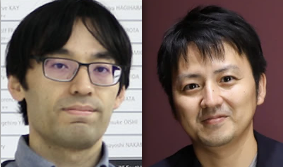MBLA LECTURE: Masakazu Nambo and Kenzo Yamatsugu
MBLA LECTURE: Masakazu Nambo and Kenzo Yamatsugu
Mon, Oct. 16, 2023, 3:00pm
ICAHN 101
Host: ERIN STACHE
3:00PM
MASAKAZU NAMBO
NEW TRANSFORMATIONS OF ORGANOSULFONE THROUGH CARBON–SULFONYL BOND ACTIVATION
Sulfur is found in diverse functional materials, natural products, and biologically active molecules. Among organosulfur compounds, organosulfones stand out as having high chemical stability and strong electron-withdrawing ability, which can dramatically change reactivities and electronic properties of molecules. However, Compared with (pseudo)halides, the sulfonyl group has been recognized to be less reactive, thereby receiving sparse attention as a leaving group in organic synthesis. Since 2013, we have focused on sulfones as new reacting templates for straightforward synthesis of organic molecules through a-functionalization followed by carbon–sulfonyl bond activation. Transiton-metal catalysts were found to be effective to promote cross-couplings and radical reactions using sulfones, providing a structurally diverse products in a modular manner. We demonstrated that not only the development of new catalysts and reagents but also the design of sulfonyl group is critically important to activate carbon–sulfonyl bonds. This work highlights the unique property of sulfonyl group as a transient directing group to construct valuable molecules by sequential functionalizations of sp3 carbon centers.
4:00PM
KENZO YAMATSUGU
CHEMICAL CATALYSIS ENABLING SYNTHETIC INTERVENTION IN CELLULAR EPIGENOME
Life emerges from biomolecules such as proteins and a network of chemical reactions intervening in them. Post-translational modifications of histone proteins are representative of these chemical reactions, and they form the basis of the epigenome by being involved in the dynamic structural changes of chromatin and the regulation of gene transcription. We have been trying synthetic intervention in the cellular epigenome by developing chemical catalysts that acylate histone proteins in living cells. In this seminar, I will introduce three chemical catalysts and their development and applications.

